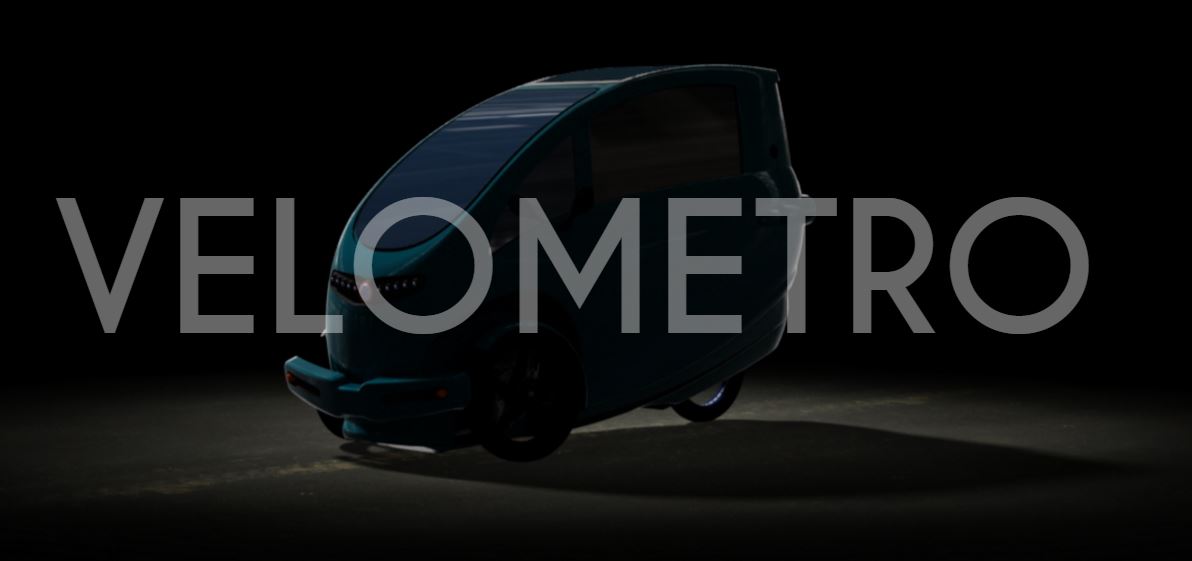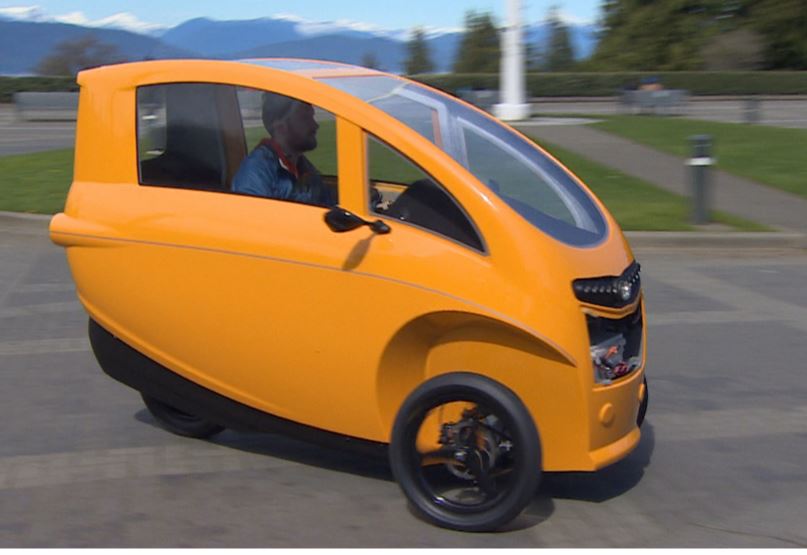
Veemo – electrical tricycle
Submitted by Marc Semail, VEVC Forum Monitor
Published by Tamara Baluja, CBC News, Mar 29, 2016
What happens when you cross a car and a bike?

That’s sort of what a Veemo is — a new electric-assist, solar-powered enclosed tricycle that might hit the streets of Vancouver as early as September.
‘It’s a very modern take on a velomobile,’ says founder of B.C.-based company.
But while it may share many characteristics with a car, you don’t need a driver’s licence for it and you can drive it in a bike lane.
 “It’s a very modern take on a velomobile,” says Kody Baker, the founder of Vancouver-based company Velo Metro.
“It’s a very modern take on a velomobile,” says Kody Baker, the founder of Vancouver-based company Velo Metro.
Veemo is designed to overcome many of the complaints commuters might have with cycling, he added.
“It’s enclosed and protects you from the weather and gives you a sense of safety in traffic. It’s an electric assist for tackling those big Vancouver hills, and it will be available on a sharing network,” he says.

Kody Baker, the founder of Velo Metro, says the Veemo will have a top speed of 32 km/h. (Christer Waara/CBC)
The electric tricycle will also function much like one of Vancouver’s many car-sharing options that allow you to reserve a machine through a smartphone app and ride it one way, he says, but will likely be 30 per cent cheaper.
It will have a top speed of 32 km/h, three wheels for increased balance, and an automatic transmission. While its current model allows for only one rider and room for groceries in the back, Baker says it might eventually be redesigned for a passenger.
Pushback from cyclists?
Baker says his company has been working with the City of Vancouver, so that it can pilot the machines in September and launch officially in 2017.
He was out Tuesday showing it to students on the UBC campus. Davin Bird, a UBC student from Fort St. James, took the Veemo out for a spin and says he would definitely sign up for it.
“It went much faster than I expected for the amount I was pedalling,” Bird said.
While some might say that the Veemo has no place on a bike lane, Baker argues that it will win over cyclists in the long run.
“We’re sure to get some pushback. We’ve been testing it in bike lanes for months around Vancouver and mostly we get a thumbs up,” he said.
“Ultimately we think this is good for the cycling community, because if we get people out of their cars and into active transportation, then it raises the safety and availability for bike routes for the entire cycling community.”
… from the Veemo Website:

SIMPLE. ACTIVE. FUN.
A New Twist on an Old Idea
Pedalled vehicles, known as velocars, were a popular mode of urban transportation in France during the 1930s and 1940s. These machines were breaking cycling speed records before being declared ineligible to race by cycling’s governing body, the UCI. Inspired by this concept, VeloMetro is building Veemo™ to meet the demands of 21st century urban residents.
Automotive Functionality, Classified as a Bicycle
Veemo™ is a sophisticated, enclosed, electric-assist, smartphone-connected vehicle, ideal for urban and suburban areas. Veemo™ are human-powered, with electric assist to help on hills and over longer distances. The enclosure protects users from inclement weather and the cargo space provides practical functionality for running errands. Veemo™ replaces automobiles, not bicycles, and they overcome the shortcomings of bicycles with all-weather use, lockable cargo space, and anti-theft provisions.
No Driver’s Licence? No Problem
This healthy, active, and environmentally-friendly mode of transportation will be available to anyone over the age of 18. Veemo™ is legally classified as a bicycle, so no driver’s licence is required! This will give access to the 50% of young adults under 25 who don’t have a driver’s licence. Users will have the ability to sign up online and ride within a few minutes using their smartphone, thereby eliminating the need to wait for a key fob or access card to be sent in the mail.
The New Sharing Economy
Our sharing service Veemo™ provides a non-car personal transportation alternative and is offered at an attractive price, compared to any conventional carshare. Our operating zones are inter-neighbourhood in urban and suburban cores. Our unique vehicle design will position our service as a highly visible consumer brand. Cities love this sustainable transportation option!
… from Now That’s Tech:
Veemo: The Vancouver-based startup is developing a point-to-point service that will allow users to rent a sort of e-bike/car hybrid, known as the Veemo. “There have been studies that have shown that up to 60 percent of a city’s population would like to cycle more, but they don’t for reasons such as not wanting to get into cycling attire, not wanting to wear a helmet, or worrying about their bike getting stolen,” VeloMetro co-founder Kody Baker tells us. “We’ve designed a vehicle and a service that addresses all of those issues.”
The Veemo is what’s known as a velomobile – a tricycle enclosed in an aerodynamic body that provides protection from the elements. Although users do pedal it, their pedalling power is augmented by a built-in electric motor, taking the trike up to an electronically-limited top speed of 20 mph (32 km/h). If that top end were any higher, the Veemo would be classified as a motor vehicle, and users would require a license.
That said, fitness-conscious users can choose to have the motor provide a lower amount of assistance for more of a workout. Other features of the vehicle include a composite monocoque [confused? definition below…] body with integrated crumple zones, an aluminum composite sandwich frame, an automatic transmission (including a reverse gear), hydraulic disc brakes, and a full LED lighting system.
The target weight of the final client-ready version is 120 kg (265 lb), and its lithium battery pack should have a range of about 100 km (62 miles) per charge.
All told, plans call for users to pay a flat rate of CAD$0.28 (currently about US$0.20) per minute. “We’re working with the City of Vancouver to get a few vehicles in with their private city staff fleet, so they’re going to be our early beta testers,” says Baker. “Then we’ll have a pilot fleet out at the University of British Columbia, for students and staff to ride around campus.”



